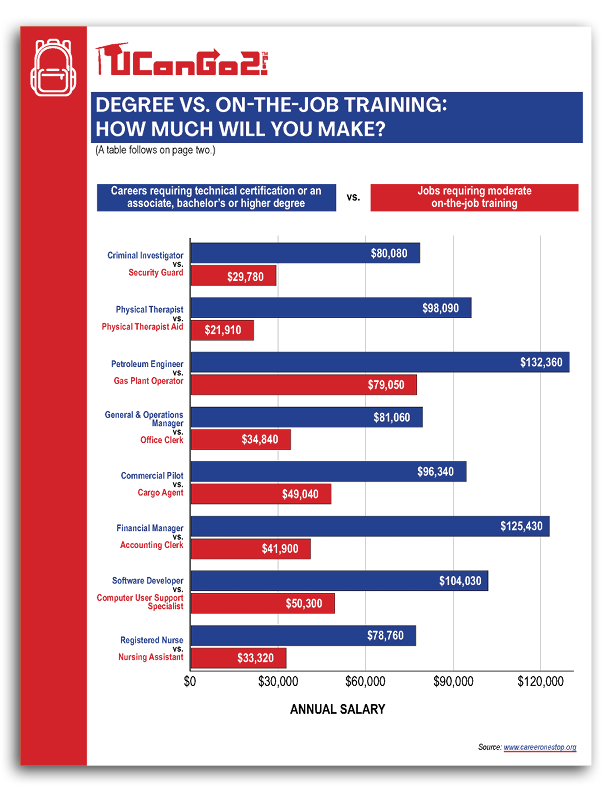Choosing to go to college is a big decision. You'll need to
think about what location and type of college is the best fit for
you, what degree you want to pursue, and how you'll pay for
college. Get started here today!
Check out the College Basics summary on the right, scroll
down the page or click a question to jump to that section of the
page.




What is college?
When we use the word "college," we're referring to all types of
training after high school: career technology centers,
trade/proprietary schools, community colleges, regional and
comprehensive universities.
When choosing a college, you'll need to think about size,
location, degrees or certifications offered, and the cost of
attendance. Use the buttons below to learn more about the types of
colleges in Oklahoma and explore colleges by region. Use the Picking a College Decision Tree to help choose
a college type based on your unique preferences.



Why should I go to
college?

- Higher Income - In general, those with some
type of degree or certification earn significantly more than those
with only a high school diploma. In fact, according to the College
Board of Advocacy and Access Communities, those with a bachelor's
degree earn about 67% more than those with only a high school
diploma. Still not convinced? Check out the Degree vs. On-the-Job Training Chart.
- Job Satisfaction - College gives you the
freedom to choose classes and a career path that interests you. If
you choose a career in a field you like, you're more likely to be
satisfied with your everyday work.
- Better Benefits - In addition to higher income
and job satisfaction, a college degree can also help open the door
to a career with health insurance coverage, paid vacation time, a
retirement package and more.
- Job Security - People with additional training
after high school are more likely to have and keep a job. A college
degree often allows you more opportunities to advance in your
career more quickly, as well.

How do I prepare for
college?
It's never too early to start preparing for education beyond
high school! Start good study habits now, research the courses
needed to be admitted to college, and consider participating in
concurrent enrollment to start earning college credit while
you're still in high school!
You aren't defined by your test scores. High ACT/SAT scores
aren't your only path to a degree-test scores are just one part of
your application package. Do the best you can on standardized tests
using our free
test prep resources!
Check out our college planning checklists to find steps you can
take each year to help prepare for education beyond high
school.
One of the best ways to narrow down your school choices is to
visit a college campus. Talk to your high school counselor to see
if they can help you arrange a campus visit or check out virtual
campus tours for Oklahoma colleges. Use the Making
the Most of Campus Visits Guide to help you along the way.
The next step is to think about how to pay for college. Check
out the Financial Aid Planning tab to learn about financial aid,
scholarships, and budgeting for college.




Adult Students
If you're an adult returning to college or attending for the
first time, check out these resources specifically designed to
support you!
Visit
ShowWhatYouKnowOK.org to find
out how your previous college credit, licenses, certifications,
military study and training or advanced standing scores can be
applied toward a degree program.
Have you already
completed some college courses? If so, you may want to look into
Reach Higher. Reach Higher
offers associate and bachelor's degrees for working adults who have
already earned some college credit and want to finish a
degree.
Micro-credentials are
alternative learning pathways directly aligned with Oklahoma's most
critical occupations. Visit
UpskillOK to
search micro-credential programs available to students and
employees. The website also enables employers to connect with
candidates who have earned a micro-credential designed to meet
evolving workplace needs.